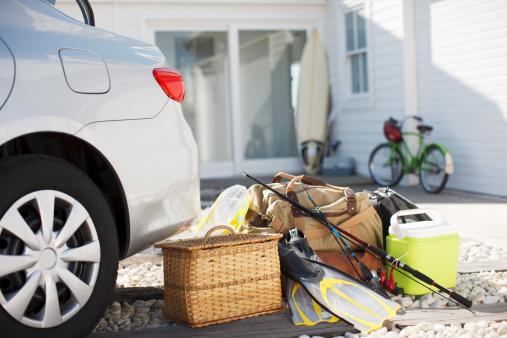
Your bags are packed, your itinerary is set and you’re counting down the minutes until you take off for your dream summer getaway. Before you head out to the airport, though, read through this checklist of important things people tend to forget before leaving for vacation.
1.) Let us know
Give us a call at 575-748-9779 before you set off on your vacay. If you’re traveling overseas, ask us about any foreign transaction fees and the best practices of using cash or debit/credit cards. We’ll help you make the best decisions for managing your money while you’re away. Plus, we’d love to hear all about your awesome travel plans!
2.) Check your auto insurance plan for coverage
If you plan on renting a car when you land, check with your auto insurance provider first to find out if rental cars are covered in your plan. If they’re not, you may want to purchase travel insurance, just in case.
3.) Pay all your bills
Before heading out on your trip, make sure all of your monthly bills are paid up. You don’t want to be busy paying bills when you’re sunning yourself on the beach or take a chance of getting hit with late fees.
4.) Set up an automatic email response
Your boss might know that you’ll be away this week, but potential and existing clients will not. Set up an automatic response that lets people know you’re out of the office to avoid appearing unprofessional or negligent.
5.) Put your mail on hold
An overflowing mailbox is an open invitation to thieves. If you’ll be gone for more than a few days, ask the USPS to put a hold on your mail. They’ll happily keep your mail at the post office until your return, at no cost to you. Alternatively, ask a neighbor to collect your mail and hold it until you return.
6.) Unplug your electronics
Don’t pay vampire charges for electronics you’re not using while you’re away. Pull the plug on all small appliances and electronics before you leave.
7.) Clean your home
Before your departure, give your house a thorough cleaning so you’ll be greeted by a spotless, clean-smelling house upon your return. Plus, you’ll avoid an invasion by ants and other critters. Here’s a quick list to get you started:
- Scrub countertops and tables.
- Wipe down the refrigerator and toss all perishables.
- Sweep and mop, or vacuum all floors.
- Take out the garbage.
- Scrub your bathrooms.
- Seal any open food packages in airtight containers.
- Pour a cup of baking soda down your drains and toilets to rid any lingering odors.
- Change your bed sheets.
Yes, you’re busy with your packing and travel arrangements now, but your post-vacation self will thank you for any scrubbing you do now.
8.) Let your mobile service provider know about your travel plans
If you’re travelling abroad, you’ll want to check with your cellphone company about possible overseas service plans that allow you to use your smartphone for calls, texts and internet access when on vacation.
9.) Shut off your main water supply
Avoid coming home to a flood by turning off your water supply before leaving on your vacay. A small, unnoticed leak can easily turn into a huge problem when left unattended for days or weeks on end.
10.) Adjust your thermostats
If you have the AC blasting throughout the summer, you’ll want to adjust your thermostat before leaving. Turning it off completely is not a good idea, because you’ll want some air to circulate for keeping the humidity under control and to avoid mold. Instead, turn it a few degrees higher than you usually keep it. You can also program your AC to go on and off while you’re away. Also, set your hot water heater to its vacation setting so it’s heating the same water less often.
11.) Invest in a timer
Keep the prowlers out by setting your lights to go on and off in different rooms and at different times of the day throughout your vacation. It’s a small investment when weighed against the money and aggravation it can save you.
12.) Confirm your reservations
It’s a good idea to confirm your flight, hotel room, car rental and attractions before setting out on your trip. You may have booked some of these reservations months ago, and you don’t want any unpleasant surprises ruining your vacation.
Your Turn: Did we miss anything? Share your own pre-vacation to-do list with us in the comments.
SOURCES:
https://www.blog.esurance.com/10-essential-things-to-do-before-leaving-for-vacation/amp/
https://www.timeinc.net/travelandleisure/travel-tips/things-to-do-before-you-go-on-vacation
https://www.mintnotion.com/travel/20-things-we-forget-to-do-before-going-on-vacation/




